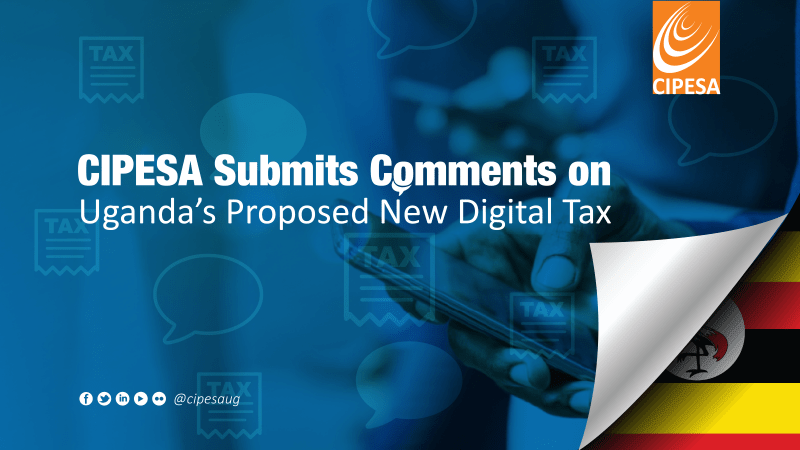By Edrine Wanyama |
On April 28, 2023, the Collaboration on International ICT Policy for East and Southern Africa (CIPESA) submitted comments on the Income Tax (Amendment) Bill, 2023 to the Committee on Finance, Planning and Economic Development of the Uganda Parliament. The comments argue that the proposed law would undermine access to and use of digital tools and services.
The bill, among others, proposes to impose a tax of five percent on foreign-based entities that derive income from providing digital services to customers in Uganda. The proposals are contained in clause 16 which seeks to introduce a new section, 86A.
Clause 86A provides:
- A tax is imposed on every non-resident person deriving income from providing digital services in Uganda to a customer in Uganda at the rate prescribed in Part IV of the Third Schedule to this Act.
- For the purposes of subsection (1), income is derived from providing a digital service in Uganda to a customer in Uganda, if the digital service is delivered over the internet, electronic network or an online platform.
- For the purposes of this section “digital service” includes—
- online advertising services;
- data services;
- services delivered through an online marketplace or intermediation platform, including an accommodation online marketplace, a vehicle hire online marketplace and any other transport online marketplace;
- digital content services, including accessing and downloading of digital content;
- online gaming services;
- cloud computing services;
- data warehousing;
- services, other than those services in this subsection, delivered through a social media platform or an internet search engine; and
- any other digital services as the Minister may prescribe by statutory instrument made under this Act.”
While the clause targets non-residents, if enacted it would add to the digital taxes borne by the already tax-burdened consumers of digital services in Uganda. Since July 1, 2022, web hosting, software and streaming services in the country pay a mandatory value added tax of 18% chargeable on consumers of services offered by platforms such as Amazon, Meta (Facebook), Twitter and Zoom.
The tax would potentially hinder inclusive access and use of digital technologies and negatively affect Uganda’s digital economy. According to the United Nations Capital Development Fund (UNCDF), Uganda’s digital economy score is low, particularly in areas such as digital inclusiveness. According to the UNCDF Score Card of 2021 the digital divide or groups most excluded from the digital economy in Uganda are the elderly (80%), rural communities (64%), persons with disabilities (74%), the youth (33%), refugees (80%) and migrants (75%). The inclusion gap such as for persons with disabilities is attributed to the high cost of technologies.
Innovation is a prerequisite for the provision of digital services including advertising, data services, marketing, cloud computing services, and data warehousing. Most of these tools and services are developed outside Uganda, hence imposing high taxes on non-residents that provide them could limit access to these critical tools and services. That could push Ugandans further into the margins of the global digital economy.
The enjoyment of digital rights and freedoms, including freedom of expression, access to information, and association, could also be limited by the imposition of high digital taxes.
Accordingly, the submission by CIPESA recommends that the Committee on Finance, Planning and Economic Development:
- Drops the entire proposed clause 16 of the Income Tax (Amendment) Bill, 2023;
- Conducts wide consultations with the affected stakeholders including the tech community, innovators, the business community and civil society on the potential effects of the proposed amendment.
- Conducts a tax impact assessment to weigh the potential effects of the proposed tax on access and use of digital tools and services. The impact assessment should specifically spell out the anticipated positive impacts and weigh them against the anticipated negative effects.
- Takes into consideration and supports all the progressive policies that seek to increase and enhance accessibility and usage of digital tools and services such as tax incentives which usually lead to lowering of the costs to be borne by consumers in purchase and use of digital tools and services.
See the full submission here.

